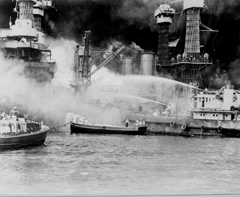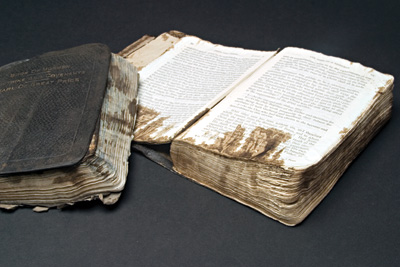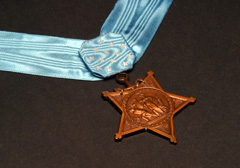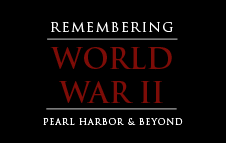
On June 21, 1941, Captain Mervyn Sharp Bennion, a naval officer with 35 years of experience, was given command of the USS West Virginia at Pearl Harbor, Hawaii. On the morning of December 7, 1941 bombers and torpedo planes began attacking the West Virginia. Fragments from a nearby ship hit Bennion in the abdomen within the first moments of the attack. Corpsmen applied a simple dressing on Bennion. Then he sent them to attend to the other injured sailors. Undeterred by his wounds, Bennion continued to issue orders for the torpedoed battleship from the bridge of the ship.

USS West Virginia
When the second wave of the Japanese attack began, Captain Bennion’s officers tried to remove him from the bridge, but he resolutely refused to leave or yield his responsibilities of command. Thirty minutes later, a fire broke out on the West Virginia below the flag bridge, making the escape of Captain Bennion and two others difficult. With great determination, officers tied him to a ladder and lifted him out.
With difficulty they carried him, unconscious, up to the navigation bridge to a corner that was free from smoke. Bennion told them to leave and to save themselves if it were possible. The USS West Virginia sank the following morning. After the ship cooled off, Captain Bennion’s body was removed. The place where he lay had not been touched by fire.
Reverence
A devout Latter-day Saint, Mervyn Bennion was preparing to attend church services when the first bombs hit the USS West Virginia. Bennion’s triple combination, consisting of the Book of Mormon, Doctrine and Covenants, and Pearl of Great Price, and his volume of Jesus the Christ by James Talmage, sustained some damage. But they survived the awful events of December 7, 1941 and were returned to his widow, Louise Clark Bennion.
 Latter-day Saint scripture
Latter-day Saint scriptureSalt Lake City: The Church of Jesus Christ of Latter-day Saints, 1920.
Medal of Honor
The Medal of Honor had its origins in purple cloth hearts designed by General George Washington as the first medal to honor the courageous actions of soldiers. While only three of Washington’s Badges of Military Merit were given, they set precedence in honoring the heroic and gallant acts of individuals in the military. In 1861 President Abraham Lincoln signed into law a provision for a Navy medal of valor “to be bestowed upon such petty officers, seamen, landsmen, and Marines as shall most distinguish themselves by their gallantry and other seamanlike qualities during the present war.” By 1862, the Army had also received congressional approval for the creation of a medal of honor to award its soldiers.

Medal of Honor

